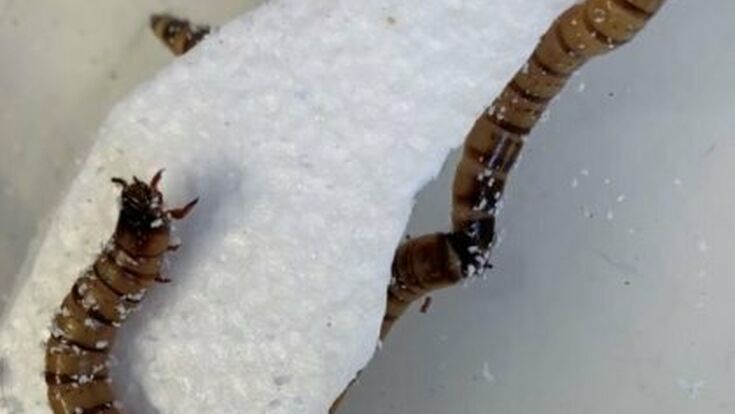Research : Are superworms the solution for our plastic waste problem?

The larvae of the large black beetle (Zophobas morio) can eat through polystyrene.
- © Chris RinkeThe amount of plastic waste is ever-growing. Since microbial processes hardly degrade it and the resulting microplastic particles do not disappear, there is an urgent need to find ways to deal with the mountains of plastic waste produced each and every day.
Enzymes have emerged as particularly promising candidates in the search for a remedy in the fight against the flood of plastics. Back in 2016, Japanese scientists discovered a bacterium that can completely degrade PET within weeks with the help of two enzymes. Last year, researchers at the University of Leipzig isolated an enzyme from compost that breaks PET down into its basic components in such a way that new PET can be produced from it.
Now researchers at the University of Queensland, Australia, (UQ) have discovered a species of worm with an appetite for polystyrene that could be the key to plastic recycling on a mass scale. The larvae of the common large black beetle (Zophobas morio), also known as superworms due to their length of around six centimetres, can eat through polystyrene, thanks to a bacterial enzyme in their gut.
In their research Dr Chris Rinke and his team from UQ’s School of Chemistry and Molecular Biosciences fed those superworms different diets over a three-week period, with some given polystyrene foam, some bran and others put on a fasting diet. “We found the superworms fed a diet of just polystyrene not only survived, but even had marginal weight gains,” Dr Rinke said. However, the weight gain of the styrofoam larvae was only a quarter of the mass gained by the superworms fed bran. Nevertheless, the observation indicates that "the worms can derive energy from the polystyrene, most likely with the help of their gut microbes", said Rinke.
The researchers used a technique called metagenomics to find several encoded enzymes with the ability to degrade polystyrene and styrene. “Superworms are like mini recycling plants, shredding the polystyrene with their mouths and then feeding it to the bacteria in their gut,” Dr Rinke said. “The breakdown products from this reaction can then be used by other microbes to create high-value compounds such as bioplastics.” However, since a Styrofoam diet alone is not healthy for the larvae, he suggests adding food waste materials or agricultural biowaste to the polystyrene to be degraded. "This could be a way to improve the health of the worms and at the same time utilise the mass food waste in western countries."
Co-author of the research, PhD candidate Jiarui Sun, said they aim to grow the gut bacteria in the lab and further test its ability to degrade polystyrene. “We can then look into how we can upscale this process to a level required for an entire recycling plant,” Ms Sun said. The long-term goal is to engineer enzymes to degrade plastic waste in recycling plants, that is to develop a superworm-free recycling system that mimics the mechanical shredding of plastic by the larvae and then decomposes it through enzymatic processes. “Our team is very excited to push the science to make it happen,” Rinke said.
This research has been published in Microbial Genomics.
